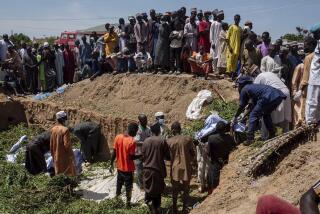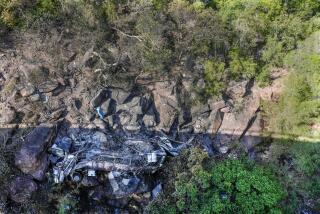Blast Kills Dozens on Bus in Somalia
- Share via
MOGADISHU, Somalia — Up to 30 bus passengers in Somalia were killed Saturday when a bag of gunpowder carried by one traveler exploded, engulfing the vehicle in a ball of flame, radio reports said.
Fire swept through the public bus when the explosion ignited barrels of fuel and a gas engine stowed on board. Some witnesses said the bus was also carrying land mines.
The driver leaped to safety through his window, and six people riding on top of the vehicle managed to dive clear when the bus exploded near Halgan, 150 miles north of the capital, Mogadishu, said Abdulleh Abdi Ali, a volunteer with the Somali Red Crescent Society.
Abdi, who was among the first rescuers to reach the bus, said the doors and windows were locked, preventing the passengers from escaping.
One of the survivors said a passenger was carrying a piece of luggage filled with gunpowder, which had been placed near the engine compartment. The heat from the engine apparently caused the powder to explode and start a fire.
“We first saw an explosion near the engine of the bus before huge flames engulfed the bus,” the survivor said.
Seven wounded were taken to the regional capital, Belet Uen, for treatment, but two of them died.
Relatives gathered to identify the dead in Halgan, which lies between the town of Bulo Burti and Belet Uen, where the bus was headed.
Abdi said he tried to help relatives identify the victims, but some were burned beyond recognition.
A growing number of militiamen in this East African country have begun disassembling their bullets to sell the copper casings and the gunpowder separately to raise money. The bag filled with gunpowder may have been on its way to be sold at the market in Belet Uen.
The blast marked Somalia’s second transportation disaster in a week. On Friday, 86 emigrants reportedly drowned after the crew of a boat carrying them to Yemen forced passengers into the sea at gunpoint when the vessel suffered engine trouble.
Somalia’s relatively new government is struggling to assert itself after faction leaders turned against each other, dividing the country into competing fiefdoms patrolled by heavily armed militias.
More to Read
Sign up for Essential California
The most important California stories and recommendations in your inbox every morning.
You may occasionally receive promotional content from the Los Angeles Times.












